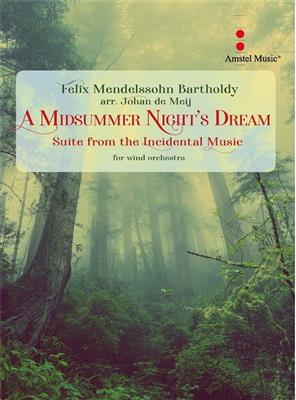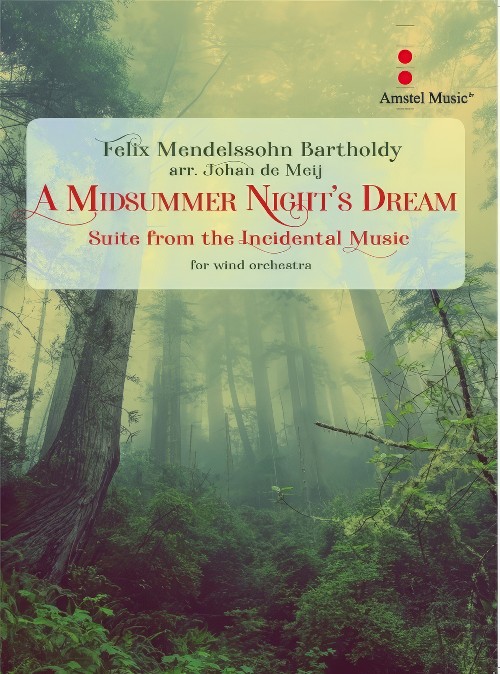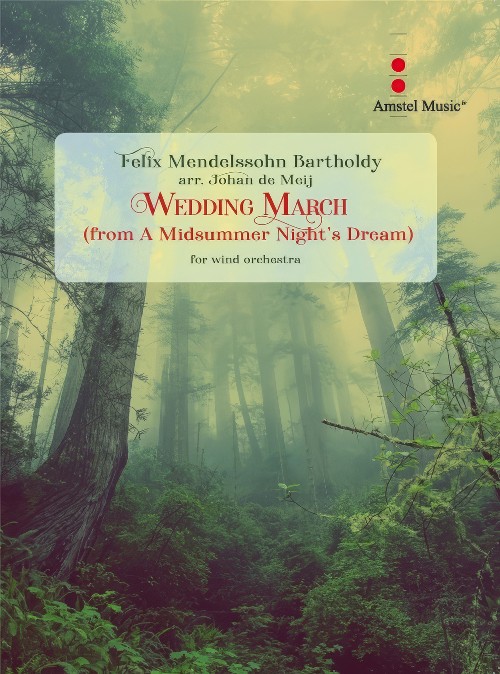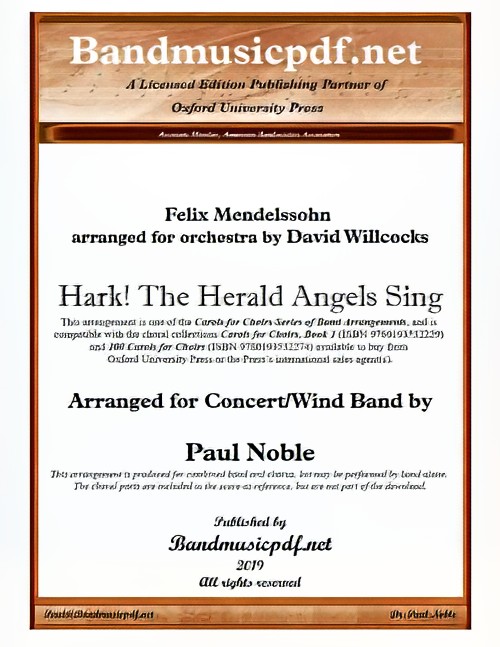Results
-
 £156.00
£156.00A Midsummer Night's Dream - Felix Mendelssohn Bartholdy
Felix Mendelssohn Bartholdy (1809 - 1847) composed the music for William Shakespeare's play A Midsummer Night's Dream at two different times. In 1826, at the age of 16, he wrote a concert overture (Op. 21). Sixteen years later, in 1842, he composed the incidental music (opus 61) for King Frederick William IV of Prussia, in which he incorporated the existing overture. The overture premiered in Stettin (then in Prussia, now Szczecin, Poland) on February 20, 1827, conducted by Carl Loewe. Mendelssohn had to travel 80 miles through a raging snowstorm to get to the concert, which became his first public appearance. The first British performance of the overture was conducted by Mendelssohn himself on June 24, 1829, at the Argyll Rooms in London. After the concert, Thomas Attwood was given the score of the overture for safekeeping, but left it in a taxi and was never found. Mendelssohn later rewrote the overture entirely from memory.
Estimated delivery 7-14 working days
-
 £156.00
£156.00A Midsummer Night's Dream (Concert Band - Score and Parts) - Mendelssohn, Felix - De Meij, Johan
Suite from the Incidental Music. Felix Mendelssohn Bartholdy (1809 - 1847) composed the music for William Shakespeare's play A Midsummer Night's Dream at two different times. In 1826, at the age of 16, he wrote a concert overture (Op. 21). Sixteen years later, in 1842, he composed the incidental music (opus 61) for King Frederick William IV of Prussia, in which he incorporated the existing overture. The overture premiered in Stettin (then in Prussia, now Szczecin, Poland) on February 20, 1827, conducted by Carl Loewe. Mendelssohn had to travel 80 miles through a raging snowstorm to get to the concert, which became his first public appearance. The first British performance of the overture was conducted by Mendelssohn himself on June 24, 1829, at the Argyll Rooms in London. After the concert, Thomas Attwood was given the score of the overture for safekeeping, but left it in a taxi and was never found. Mendelssohn later rewrote the overture entirely from memory.Duration: 14.45
Estimated delivery 7-14 working days
-
 £68.00
£68.00Wedding March - Felix Mendelssohn Bartholdy
Felix Mendelssohn Bartholdy (1809 - 1847) composed the music for William Shakespeare's play A Midsummer Night's Dream at two different times. In 1826, at the age of 16, he wrote a concert overture (Op. 21). Sixteen years later, in 1842, he composed the incidental music (opus 61) for King Frederick William IV of Prussia, in which he incorporated the existing overture. The overture premiered in Stettin (then in Prussia, now Szczecin, Poland) on February 20, 1827, conducted by Carl Loewe. Mendelssohn had to travel 80 miles through a raging snowstorm to get to the concert, which became his first public appearance. The interlude between the 4th and 5th acts of the incidental music is the famous Wedding March, Mendelssohn's most popular and most performed work.
Estimated delivery 7-14 working days
-
 £68.00
£68.00Wedding March (from A Midsummer Night's Dream) (Concert Band - Score and Parts) - Mendelssohn, Felix - De Meij, Johan
Felix Mendelssohn Bartholdy (1809 - 1847) composed the music for William Shakespeare's play A Midsummer Night's Dream at two different times. In 1826, at the age of 16, he wrote a concert overture (Op. 21). Sixteen years later, in 1842, he composed the incidental music (opus 61) for King Frederick William IV of Prussia, in which he incorporated the existing overture. The overture premiered in Stettin (then in Prussia, now Szczecin, Poland) on February 20, 1827, conducted by Carl Loewe. Mendelssohn had to travel 80 miles through a raging snowstorm to get to the concert, which became his first public appearance. The interlude between the 4th and 5th acts of the incidental music is the famous Wedding March, Mendelssohn's most popular and most performed work. Duration: 4.30
Estimated delivery 7-14 working days
-
 £84.99
£84.99Wachet Auf! - Felix Mendelssohn Bartholdy
This excellent arrangement by Robert van Beringen is of the well-known German chorale Wachet auf, ruft uns die Stimme, taken from the oratorio Paulus (St. Paul) by Felix Mendelssohn Bartholdy (1809-1847). Although accredited to Mendelssohn it is thought the melody was in fact written by the pastor and poet Philipp Nicolai in 1599. Robert van Beringen's arrangement perfectly captures the biblical story of St. Paul.
Estimated delivery 7-14 working days
-
£64.99
Theme from Symphony no. 4 - Felix Mendelssohn Bartholdy
Mendelssohn for band! Mendelssohn is known for the beauty of his melodic themes, and this one from the "Italian" Symphony certainly fits that category. THEME from SYMPHONY #4 gives impressions of the people and landscapes of this beautiful country. A bucolic sense pervades the score and translates into a restful and uplifting musical experience.Douglas Court has done a marvelous job in bringing the orchestral textures to the young band stage. His considerable experience with directing young bands and his many fine compositions expressly for musicians at this level give him the ability to make the music as playable as it is authentic. Don't miss it!
Estimated delivery 7-14 working days
-
 £75.00
£75.00Hark! The Herald Angels Sing (Concert Band with Optional Choir - Score and Parts) - Mendelssohn, Felix - Noble & Willcocks
Hark! The Herald Angels Sing is a Christmas carol that first appeared in 1739 in the collection Hymns and Sacred Poems. Its lyrics had been written by Charles Wesley. Inspired by the sounds of London church bells while walking to church on Christmas Day, he wrote the Hark poem about a year after his conversion to be read on Christmas Day. The popular version is the result of alterations by various hands, notably by Wesley's co-worker George Whitefield who changed the opening couplet to the familiar one, and by Felix Mendelssohn, whose melody was used for the lyrics. In 1840, a hundred years after the publication of Hymns and Sacred Poems, Mendelssohn composed a cantata to commemorate Johann Gutenberg's invention of movable type printing, and it is music from this cantata, adapted by the English musician William H. Cummings to fit the lyrics of Hark! The Herald Angels Sing, that propels the carol known today. This arrangement represents one in the Series of Band Arrangements compatible with David Willcocks' Carols for Choirs.
Estimated delivery 7-14 working days
-
 £86.50
£86.50Overture for Winds, Op. 24 - By Felix Mendelssohn / arr. John Boyd
Written for eleven winds when Mendelssohn was fifteen years old, it has been set for contemporary wind band (the saxophone parts are optional, staying with a desire for historical accuracy to the extent feasible), this is a shining jewel of music. With care towards balance, articulation, and musicality, this is a solid repertoire piece for advanced groups. This edition also preserves the instrumentation of the 1826 autograph should the conductor choose to reduce the number of players to the original eleven winds. A terrific recording is available on Kosei KOCD 31993566.
Estimated delivery 3-5 days
-
 £6.25
£6.25March, Opus 108 - By Felix Mendelssohn / arr. Todd Stalter
Mendelssohn wrote his "March," op. 108, in 1841 for a festival celebrating the famous painter Peter Von Cornelius' visit to Dresden. It is a stately and festive sounding work, and a rarely performed gem by one of the world's great composers. Careful observance of articulations and dynamics will make this march spring to life. This title is available in SmartMusic.
Estimated delivery 3-5 days
-
 £6.25
£6.25War March of the Priests - By Felix Mendelssohn / arr. Todd Stalter
Although more famous for his incidental music to A Midsummer Night's Dream, Mendelssohn was commissioned by the King of Prussia to provide music for Racine's religious drama Athalie, which includes the "War March of the Priests." The march tune draws its energy from a repeating triplet figure in the introduction, and features a nice legato contrasting section. A great opportunity to teach style and nuance! (2:45)
Estimated delivery 3-5 days
